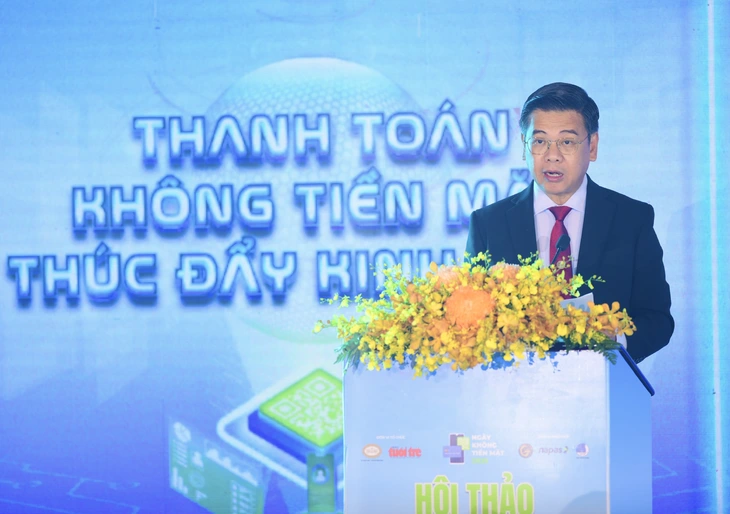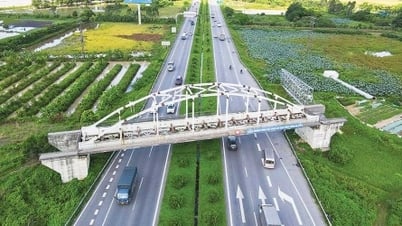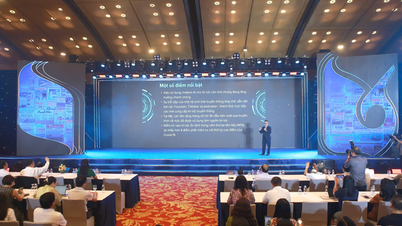Speaking at the final workshop of the workshop “Cashless payment: Driving force for digital economic growth” held on June 14, 2025, Deputy Prime Minister Ho Duc Phoc said that when developing e-commerce, cashless payment is of course required. Because cashless payment is fast, timely, and only takes a few seconds. At the same time, it helps to make cash flow transparent, promoting the development of the digital economy.
 |
| Deputy Prime Minister Ho Duc Phoc |
At the same time, cashless payments not only promote the efficiency of the banking industry but also help increase transparency in financial management, support e-commerce and public services, improve labor productivity and reduce social costs.
According to statistics from the State Bank of Vietnam, by the end of 2024, Vietnam will have more than 204.5 million individual customer payment accounts; 154.1 million bank cards in circulation. Nearly 87% of adults have bank accounts. Cashless payments are present in all areas of the economy and social life such as tuition, hospital fees, shopping, etc.
In addition to the outstanding results that the banking sector has brought in developing non-cash payments, contributing to the growth of the digital economy, the Deputy Prime Minister said that it is necessary to frankly acknowledge some shortcomings such as cyber security and personal data protection in digital payments, especially in the context of increasingly sophisticated high-tech crimes. Therefore, it is necessary to perfect appropriate institutions and policies, create favorable conditions for innovative payment models, while ensuring risk management and system safety, and protecting people's assets.
Mr. Nguyen Van Dung - Vice Chairman of Ho Chi Minh City People's Committee also shared that cashless payment has become an objective and popular trend in today's life. It is easy to see this trend in many places such as: shops, coffee shops, cashless transactions. This is a great effort to help people get into the habit of not using cash...
 |
| Mr. Nguyen Van Dung - Vice Chairman of Ho Chi Minh City People's Committee |
In Ho Chi Minh City alone, Mr. Dung said, the City has issued a plan to develop cashless payments in the area with many measures and solutions to promote digital payments in all areas of public services,education , health, transportation, and trade promotion activities. In addition, synchronous solutions to promote communication, raise awareness and digital financial skills for people, creating a solid foundation for a cashless society.
However, according to Mr. Dung, from the implementation practice in Ho Chi Minh City, the implementation of cashless payment still has certain difficulties and limitations. In particular, the issue of transaction security for users is one of the obstacles that makes people hesitant to use it, especially in the context of increasingly sophisticated and complicated risks, high-tech crimes, fraud, and personal data theft.
In order for the implementation of cashless payments to truly go into depth and spread widely, there needs to be synchronous coordination between all levels and sectors. The Vice Chairman of the Ho Chi Minh City People's Committee made a number of proposals to further develop the implementation of cashless payments.
Firstly, the Government directs central ministries and branches to continue perfecting legal regulations related to the implementation of non-cash payments, ensuring consistency with the revised Law on Credit Institutions in 2024, Decree 52 and regulations on personal information security and safety, creating a legal corridor for synchronous payment activities.
Second, it is recommended that state management agencies and experts discuss and share experiences in promoting digital payments in e-commerce, the role of data connection solutions in promoting digital economic development, and specific recommendations for Ho Chi Minh City.
Third, departments, branches, and People's Committees of wards and communes should proactively review and integrate contents and promote the implementation of cashless payments into the regular work programs of local units. Focus on synchronously implementing groups of solutions to enhance the application of electronic payments in public services, especially in the fields of public administration, education, health, transportation, taxes and fees, ensuring convenient and safe payment processes.
Ho Chi Minh City also proposed solutions to support businesses, business households, small traders, and people to apply digital payment solutions suitable to their scale and actual conditions. At the same time, promote communication activities on many platforms to raise awareness and skills in using cashless payments for people, and encourage changes in cash usage habits in the community, especially in residential areas, traditional markets, and suburban areas.
Fourth, units such as the State Bank of Vietnam, Region 2 Branch, departments and branches coordinate with central ministries and branches to connect data between sectors and fields to form a digital ecosystem of smart payments in the city. Cashless payments will continue to be an important driving force to promote the digital economy, contributing to building a more modern, efficient and equitable society.
 |
| Ms. Le Hoang Oanh, Director of the Department of E-commerce and Digital Economy (Ministry of Industry and Trade) |
Ms. Le Hoang Oanh, Director of the Department of E-commerce and Digital Economy (Ministry of Industry and Trade), said that the strong boom of the digital economy in Vietnam has contributed 18.7% to the national GDP. Vietnam is the leading country in e-commerce growth with an average growth of 16-30%/year. Thereby improving the efficiency of the modern distribution system; promoting domestic consumption and creating many new business models in recent times.
To develop the digital economy, according to Ms. Oanh, digital payments and e-commerce go hand in hand. However, in reality, the percentage of e-commerce consumers choosing the cash-on-delivery (COD) payment method accounts for 77.5%. The reason is that a part of the population still maintains the habit and mentality of using cash when paying.
Crimes in the field of high technology and electronic payments; counterfeit and poor quality goods. In addition, information technology infrastructure is not yet synchronized, especially in rural areas. To develop e-commerce, in June, the Ministry of Industry and Trade issued a master plan for national e-commerce development for the period 2026 - 2030.
One notable goal is the plan to set a target of 80% cashless payment rate in e-commerce by 2030. In addition, the Director of the Department of E-commerce and Digital Economy proposed to complete the legal framework and policy mechanism, develop core technology infrastructure and ensure safety and security.
Provide cashless payment solutions to support traditional market traders; Strengthen connectivity and integrate cashless payment infrastructure. At the same time, there needs to be convenient payment solutions on mobile devices. Particularly in traditional markets, Ms. Oanh said that the industry and trade sector will focus on convenient solutions and cost reduction to help traders participate in e-commerce development and improve business efficiency.
Source: https://baodautu.vn/day-manh-thanh-toan-phi-tien-mat-minh-bach-hoa-dong-tien-thuc-day-kinh-te-so-d304085.html














































































































Comment (0)